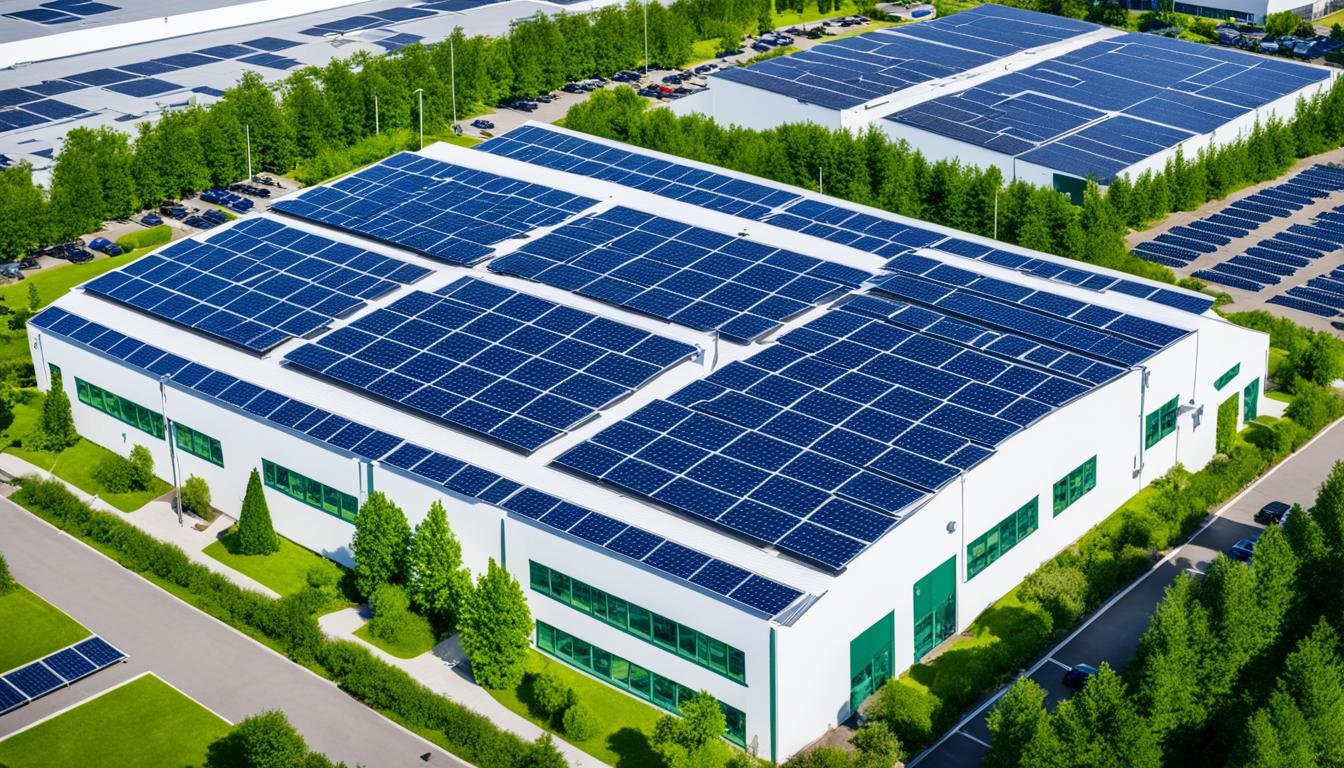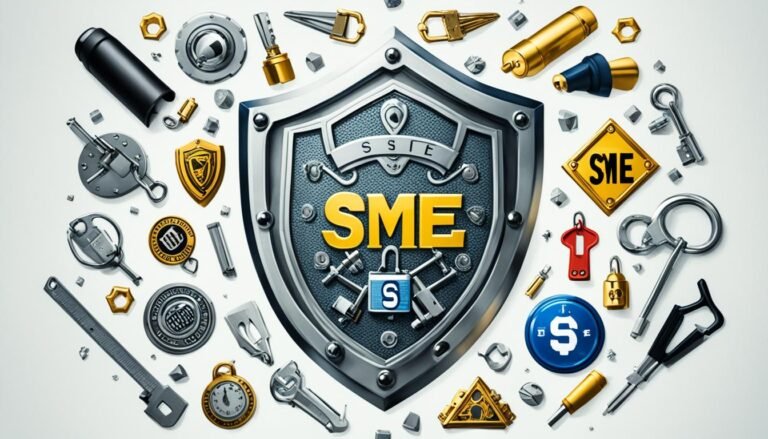Environmental Compliance Audits for SMEs
Small and medium-sized enterprises make up over 99% of US businesses. They are crucial to the economy. Yet, they also deal with unique difficulties, like following environmental rules to protect our planet.
For SMEs, environmental compliance audits are a must. They help SMEs understand complex environmental regulations and meet the standards. These audits point out if SMEs aren’t following the rules. They also offer advice on how to start and keep following them.
This article looks into why these audits matter for SMEs. It shows how these checks help businesses follow environmental rules. And they encourage using practices that are good for the planet and for the business.
Key Takeaways:
- SMEs account for over 99% of all businesses in the United States.
- Environmental compliance audits help SMEs navigate environmental regulations.
- These audits identify areas of non-compliance and guide businesses towards compliance.
- Environmental compliance audits promote sustainable business practices.
- SMEs can benefit from expert guidance in maintaining compliance and reducing their environmental impact.
Importance of Environmental Planning
Environmental planning is key to avoiding future obstacles. It ensures companies follow environmental rules. Small and medium businesses can gain a lot by adding this to their daily work. This includes doing thorough checks on how well they’re following the rules. They can then find ways to do better and keep following the rules.
These detailed checks look at how waste, energy, and gases are handled. They not only spot where rules are missed but show ways to get better. This might also save resources.
Streamlining Compliance Efforts
Environmental planning helps businesses understand the rules and what they need to report. This gives them a clear plan to avoid fines and legal issues. It also helps them deal with possible harm to the environment and stay on track with the laws.
“Environmental planning and compliance audits are essential for SMEs to navigate the complex landscape of environmental regulations, minimize risks, and create a sustainable business environment.”
When companies make this a core part of their strategy, they’re more responsible. This approach means they might do better in the long run. It also makes people like customers and investors think more of them.
Key Benefits of Environmental Planning
- Ensuring compliance with environmental regulations
- Identifying areas for improvement and resource conservation
- Streamlining compliance efforts and reducing legal risks
- Creating a culture of environmental responsibility
- Enhancing the company’s reputation and stakeholder relationships
Case Study: Implementing Environmental Planning
Let’s look at Green Solutions, a small manufacturer, to see the gains of this planning. They found ways to handle waste better and use less energy through a big audit.
Experts then helped them cut waste and buy energy-saving gear. This made Green Solutions better for the planet and saved them money.
They also started to buy from suppliers who care about the environment. This helped their supply chain and made them look good.
Environmental Permitting for SMEs
SMEs often need various permits to follow environmental rules. These are key for SMEs to work legally and care for the environment. Permits cover things like managing stormwater, handling waste, and controlling air pollution.
To help SMEs, there are audit services for environmental compliance. They guide SMEs on needed permits and help with getting through the application process. With professional help, SMEs can get permits faster and ensure they meet rules.
One important part of getting environmental permits is knowing the different rules SMEs must follow. Depending on their size and what they do, SMEs might need permits from federal, state, and local levels. It’s hard for SMEs to deal with the rules from so many places.
Types of Environmental Permits
SMEs might need permits like those for stormwater and wastewater. This ensures they manage water pollution correctly. They could also require permits for handling solid or hazardous waste safely.
- Stormwater and wastewater discharge permits: SMEs that generate wastewater or have stormwater runoff from their operations must obtain permits to ensure proper management and prevent pollution of water bodies.
- Permits for solid and hazardous waste management: SMEs that handle, store, or dispose of solid or hazardous waste must comply with regulations and obtain permits to ensure safe and environmentally responsible practices.
- Permits for air pollutant emissions: SMEs that release air pollutants must get permits to monitor and reduce their pollution levels according to set standards.
Talking to environmental compliance auditors can help SMEs know what permits they need and how to get them. These pros know the permit process well. They can help SMEs with the paperwork and talk to officials about the technical stuff.
Getting the right permits is vital for SMEs to work correctly and help the environment. With support from audit services, SMEs can deal with the complex rules. This helps them to show they are serious about protecting the planet.
Types of Environmental Permits
| Permit Type | Description |
|---|---|
| Stormwater and wastewater discharge permits | Permits for managing and preventing pollution of water bodies from wastewater and stormwater runoff. |
| Permits for solid and hazardous waste management | Permits for ensuring safe handling, storage, and disposal of solid and hazardous waste. |
| Permits for air pollutant emissions | Permits for monitoring and controlling air pollutant emissions in accordance with air quality standards. |
Post-permit Support for SMEs
After getting environmental permits, SMEs must keep up with rules and environmental standards. They have to report on air emissions and use of toxics. Experts in environmental audits can help them handle these tasks.
To manage and report air emissions, SMEs need strong systems in place. This ensures they follow all the rules. It also helps lessen their impact on the environment.
SMEs might also need to report on toxics use. This report shows how they use and get rid of dangerous chemicals. Support services help SMEs do this correctly, avoiding penalties and harm to the environment.
Customized Regulatory Training
Customized training is a big part of post-permit support. It makes sure everyone knows the environmental laws and their job in keeping the company in line.
These training sessions focus on your industry’s needs. They cover waste management, stopping pollution, and emission rules. The aim is to equip all workers with the knowledge to do their part.
This training also keeps SMEs updated on environmental rule changes. This makes sure they keep up their good work in following the law.
Integrating Post-permit Support into Environmental Management
The support SMEs get after their permits are key to keeping up with laws and staying green. Working with audit pros lets SMEs deal well with their post-permit tasks.
This support helps SMEs not just with rules but to do better for the environment. It encourages a sustainable culture at their workplace.
Environmental Management Systems (EMS) Support for SMEs
Environmental Management Systems (EMS) are vital for small and medium-sized enterprises (SMEs) to follow environmental rules. For SMEs needing help with EMS, there are services just for them. These services help in many ways, tailored to the company’s needs.
- Occasional Technical Support: Expert help is available whenever SMEs need it for tough environmental questions. This support means SMEs can make quick and smart choices to stay compliant.
- Corporate Environmental Manager: Sometimes, it’s better for SMEs to get help managing the environment from experts. They act as environmental managers, making sure the EMS works well throughout the business.
- ISO Compliance Audits: Meeting ISO standards is key in environmental management. Services check SMEs’ EMS against these high global benchmarks. This helps SMEs find ways to do better and meet top industry practices.
- Custom On-Site Environmental Training: Employees need to know how to follow environmental rules properly. Experts offer training right at the SME’s location. This training makes sure everyone can help keep the EMS running right.
- Development of Compliance Tools and Procedures: Services can create special tools and rules just for what the SME does. This makes following the rules simpler and helps the EMS work better and track compliance well.
By using these services, SMEs can get the full support they need for their EMS, from occasional help to having their own environmental manager. With ISO audits, special training, and made-for-them tools, SMEs can get better at environmental care. They can also follow the rules smoothly.
Stay tuned for the next section of our article to learn more about pollution prevention and resource conservation strategies for SMEs.
Pollution Prevention and Resource Conservation for SMEs
Implementing pollution prevention plans and conserving resources can help SMEs. They lessen their effect on the environment and follow sustainable practices. This includes steps such as spill prevention, lowering toxic use, and saving energy and water. By doing so, SMEs can decrease their ecological impact and help preserve nature.
Experts in environmental audits are vital for SMEs. They help set up effective plans to reduce pollution. Their knowledge helps companies find and lessen risks. Plus, they aid in following environmental laws properly along with focusing on conservation.
The Benefits of Pollution Prevention Plans
Pollution prevention plans bring several key benefits to small businesses. They let SMEs deal with environmental risks before they cause harm. This reduces the chance of pollution and the costs that come with it.
These plans also lower costs by using resources more wisely. SMEs can decrease pollution, work better, and save money. Such steps are key to improving efficiency and being kinder to the planet.
“Implementing pollution prevention plans offers numerous advantages to SMEs, including proactive hazard mitigation, reduced environmental liabilities, and cost savings through resource optimization.”
By conserving resources, SMEs show they care about the planet. This can attract customers who value environmentally friendly businesses. Such practices can also improve a company’s image, making it more competitive.
Resource Conservation Strategies
Resource conservation involves using various methods to be more sustainable. This includes saving energy, water, and managing waste better.
- Energy Conservation: Utilizing new technologies and reducing energy use to save power. This helps with the overall environmental footprint.
- Water Conservation: Installing water-saving tools and recycling water can make a big difference. It’s a crucial step for sustainability.
- Waste Reduction and Recycling: Cutting down on waste and promoting recycling helps the planet. It’s an essential part of being eco-friendly.
Expert help is available for SMEs to carry out these conservation strategies. This professional input can significantly improve how companies use resources wisely.
In conclusion, pollution prevention and resource conservation are vital for SMEs. These protect the environment, reduce risks, and cut costs. With support from environmental experts, small businesses can make a big difference. They can manage their environmental impact responsibly and strive for a sustainable future.
Due Diligence and Technical Review for SMEs
Small and medium enterprises (SMEs) looking into site development or buying property can gain from due diligence. This involves Phase I and Phase II Environmental Site Assessments (ESAs). These reviews spot any environmental issues or risks tied to the location.
Experts in environmental regulations help in this process. They ensure SMEs fully grasp the potential environmental dangers and solutions for them.
“Phase I and Phase II Environmental Site Assessments are key in due diligence for SMEs. They highlight any issues that might affect the property deal or its cost. Doing a detailed check helps SMEs make wise choices and avoid future problems,” explained John Thompson, an experienced environmental consultant.
The first step in assessment is the Phase I ESAs. These include looking at past records, checking the site, and talking with people to pinpoint possible dangers. If risks are found, Phase II ESAs might follow. These involve taking samples and doing tests to confirm the risk of dangerous substances.
The assessment reports undergo thorough checks by environmental compliance experts. Their job is to make sure the reports are correct and that they offer clear solutions. They guide on the best ways to fix any problems and help SMEs choose clearly based on the report findings.
“In the due diligence process, a strong technical review is essential. It helps SMEs know about and deal with possible environmental risks involved. With the help of these experts, SMEs can manage dangers well and stay within the law,” shared Sarah Johnson, an environmental expert in this area.
Getting help from pro environmental compliance auditors, SMEs can smoothly go through the due diligence phase. This ensures they spot and deal with all environmental concerns early. It helps them in making informed choices, safeguarding their investments, and reducing any environmental harm.
Example Table: Comparison of Phase I and Phase II Environmental Site Assessments
| Aspect | Phase I ESA | Phase II ESA |
|---|---|---|
| Objective | Identify potential environmental risks and liabilities | Confirm the presence of hazardous substances and assess the extent of contamination |
| Methods | Review of historical records, site inspections, and interviews | Sample collection, laboratory testing, and detailed site investigations |
| Scope | Broad overview of environmental conditions | Detailed analysis of specific environmental concerns |
| Findings | Identification of potential risks and recommendations for further investigation | Confirmation of hazardous substances, contamination levels, and potential remediation measures |
| Timeframe | Usually completed within a few weeks | Timeline depends on the complexity of the site and required testing |
Industrial Hygiene and Indoor Air Quality for SMEs
Small and medium-sized enterprises (SMEs) must focus on workplace conditions. This is key to keeping their workers safe and healthy. It also ensures they meet safety regulations. By looking into industrial hygiene and air quality, SMEs can make their workspaces better. This boosts safety and the health of everyone there.
Professionals who check environmental compliance are very important. They help SMEs inspect their workplace. They look at things like air flow, how air moves around, temperature, and if there are any harmful things in the air.
These experts give SMEs great advice on staying healthy and avoiding injuries. They might suggest ways to make the air better. For example, they can recommend using ventilation systems, keeping equipment in good shape, and using fewer dangerous materials. This advice helps keep respiratory problems and allergies away from workers.
Besides, these professionals can also help SMEs create safety rules and policies. They offer training to make employees understand the need for a safe and healthy workplace.
By following the advice from environmental compliance experts, SMEs can make safety a priority. They encourage everyone at work to focus on keeping the place clean and the air safe.
To wrap it up, paying attention to workplace air and industrial hygiene is very important for SMEs. Professionals in environmental compliance can guide them to a safer working environment. This care for workers boosts how well they work and how happy they are with their job.
Geotechnical Engineering and Testing for SMEs
SMEs working on projects like houses, buildings, or city facilities can gain a lot from geotechnical services. These services make sure the project starts on a strong base and meets high safety standards.
Geotechnical engineering studies the soil and rocks on a project site. It’s important for choosing the right foundation, knowing how much weight the ground can hold, and spotting any risks like soil movement or steep slopes falling.
To learn about the soil and rocks, engineers do different tests. For soil, they check things like how big the grains are, how tightly packed it is, how strong it is, if water moves through it easily, and how it squashes when pressed. These tests help decide if the ground is good for building and guide the project’s design and building choices.
Hiring experts in geotechnical engineering also means SMEs get help with environmental rules. These pros work in labs with the newest testing gear. This helps get soil results quickly and accurately.
Benefits of Geotechnical Engineering and Testing:
- Identification of potential subsurface risks and hazards
- Determination of appropriate foundation design and construction methods
- Assessment of soil and rock stability
- Enhanced structural integrity and safety of the project
- Optimization of construction costs and timelines
Case Study: Residential Housing Development
Recently, geotechnical engineering was key to the safety of some homes. They checked the soil and rocks carefully, finding areas where the soil might move a lot. Knowing this early, they designed the homes’ foundations to be safe. Solving these problems from the start helped avoid big costs and kept the homes safe.
Conclusion
Environmental compliance audits are key for SMEs to follow rules and regulations. They offer tips and advice for better, sustainable practices. By using these audit services, SMEs can understand difficult rules, find where they need to improve, and lessen their impact on the environment.
Experts in audits give SMEs plans that fit their needs to meet environmental rules. This helps SMEs check what they are doing now, find out what they need to fix, and make plans to follow the rules. With the help of these experts, SMEs can overcome environmental issues and encourage a green mindset.
Using green rules in daily work is crucial for SMEs to do well and harm the environment less. Doing regular green audits helps SMEs make good systems to cut risks, waste, and use resources better. This way, SMEs not only follow the rules but show they care about the planet and build a good image.
To wrap up, SME environmental audits are big helps for small businesses with environmental rules. These services offer the skills and advice to keep SMEs eco-friendly and rule-following. When a business focuses on being green, it safeguards the Earth, improves its image, and helps make the future cleaner.
FAQ
Q: What is an environmental compliance audit?
A: An environmental compliance audit checks if small and medium companies follow environmental rules. It makes sure they keep up with laws and standards.
Q: Why are environmental compliance audits important for SMEs?
A: These audits help SMEs find places where they’re not following the rules. They also get advice on how to fix this. This way, they can stay within the law.
Q: What is an environmental compliance checklist?
A: The checklist is like a to-do list for the audit. It looks at things such as waste, energy, and pollution management. This helps figure out where a company needs to do better.
Q: How does environmental planning help SMEs ensure compliance?
A: Planning ahead allows SMEs to tackle environmental issues before they become big problems. It helps them integrate environmental concerns into their daily tasks more easily.
Q: What permits do SMEs need to comply with environmental regulations?
A: SMEs might need permits for things like water or waste management, and handling air pollution. Experts who do these audits can help companies get the right permits.
Q: How can environmental compliance audit professionals assist SMEs in the permitting process?
A: These experts can guide the whole permit process. They help SMEs talk to the authorities and make sure they understand what’s needed.
Q: What ongoing responsibilities do SMEs have after obtaining environmental permits?
A: After getting permits, SMEs must keep up with certain reports. Experts in compliance audits can help them set up the right tracking and training to meet these requirements.
Q: How can SMEs maintain environmental compliance with the help of an Environmental Management System (EMS)?
A: An EMS makes it easier for SMEs to be good environmentally and follow the rules. It offers different services like audits, training, and tools to help stay on track.
Q: What are pollution prevention plans and resource conservation strategies for SMEs?
A: These are plans that help SMEs hurt the environment less. They cover things like preventing spills, reducing toxic substances, and saving energy, water, and waste.
Q: How can environmental compliance audit professionals assist SMEs in developing and implementing pollution prevention plans and resource conservation strategies?
A: They can help plan and put in place strategies to be more eco-friendly. This includes making sure SMEs comply and do things that are good for the environment.
Q: How do environmental compliance audits help SMEs in due diligence and technical review?
A: These audits help check all the environmental aspects of a site or project. They make sure everything is up to scratch, avoiding any environmental problems later on.
Q: How can environmental compliance audit professionals help SMEs ensure workplace health and safety?
A: They check the workspace to reduce risks of sickness or injury. By improving the air and work conditions, they make it a safer place for employees.
Q: How do geotechnical engineering and testing services benefit SMEs involved in projects?
A: These services make sure a project is on steady ground, meeting engineering standards. Specialists in these audits have labs for quick and accurate tests, ensuring a project’s safety.
Q: How do environmental compliance audits help SMEs meet environmental standards?
A: The audits give SMEs custom advice for meeting laws and being eco-friendly. They help SMEs understand environmental rules better and work on fixing any problems.







